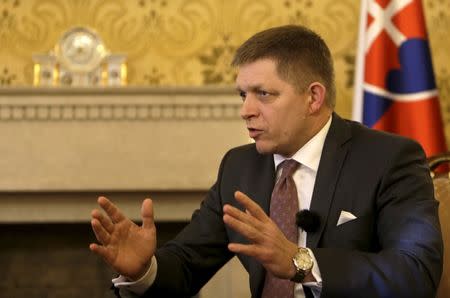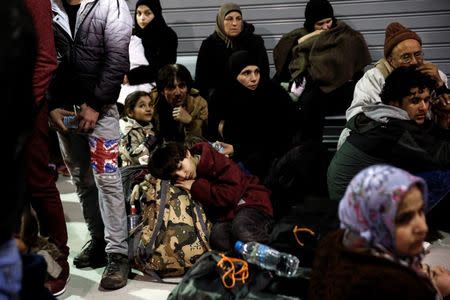Slovak leader says EU agreement may not stem migrant flow from Turkey
By Tatiana Jancarikova and Jan Lopatka BRATISLAVA (Reuters) - It is likely the numbers of migrants coming to Greece from Turkey will not drop in the coming weeks despite a European Union agreement and the EU should take steps to prepare new options, Slovak Prime Minister Robert Fico said on Monday. Fico, who has made a tough stance on migration the cornerstone of his policies before a March 5 election, told Reuters the government was prepared to erect mobile barriers on borders with Austria and Hungary to direct the flow of migrants he fears will rise soon. Slovakia has so far seen only a trickle of migrants across its territory on their way from Syria or Afghanistan to western Europe. It has taken a particularly strong stand against accepting any significant numbers of Muslims who Fico says could not integrate. Fico said calls by Slovakia and other central European countries of the Visegrad Four - Hungary, the Czech Republic and Poland - for strict border protection were winning acceptance across the EU as it grapples with the migration crisis and a number of countries cap the numbers they are willing to accept. EU countries earlier this month approved a 3 billion euro (£2.3 billion) fund for Turkey to improve living conditions for refugees there in exchange for Ankara ensuring fewer of them migrate on to Europe. The EU is counting on the deal to lower the number of asylum seekers arriving in Europe after more than one million streamed onto the continent in 2015, mainly by sea from Turkey, with figures indicating little sign of the flow ebbing so far this year. The next two or three weeks would show if the agreement between the EU and Turkey to limit the flow of migrants was working and if Greece was meeting its obligations on border control, Fico said. "If that does not work, and I am very pessimistic, and all of us in Europe will insist on proper protection of external borders, there will be nothing left but protecting the border on the line of Greece-Macedonia and Greece-Bulgaria," he said. The plan was proposed by the Visegrad Four before last week's EU summit and won some sympathy from countries like Austria but was dismissed by Germany, which stressed the need to make the deal with Turkey work. Fico said it was clear that a common solution was needed but at some point Greece may have to be let go and the border defence built at its northern border, even if it means an unbearable accumulation of migrants in Greece. "There was a correct decision, for now, not to expose Greece ... to this situation but it is only a matter of time when we say that it is simply not possible to go on like this any more," he said. Austria announced last week it would cap the daily numbers of people seeking asylum or passage to Germany. Fico said this could lead to people trying to bypass bottlenecks on the border between Slovenia and Austria via different routes that could lead through Slovakia. He said the government was ready to detain those not seeking asylum there and return them across the border. The authorities are ready to erect barriers on Hungarian and Austrian borders to direct the potential flow, he said. "There is a big risk, and the weekend confirmed this, that migrants will try to go around this Slovenian-Austrian border and get north through Hungary to Slovakia and on to the Czech Republic and Germany," he said. Hungarian police detained 501 migrants over the weekend who cut their way through Hungary's steel border fence, the highest number since it sealed off its southern borders in mid-October. (Editing by Richard Balmforth)

 Yahoo News
Yahoo News 

